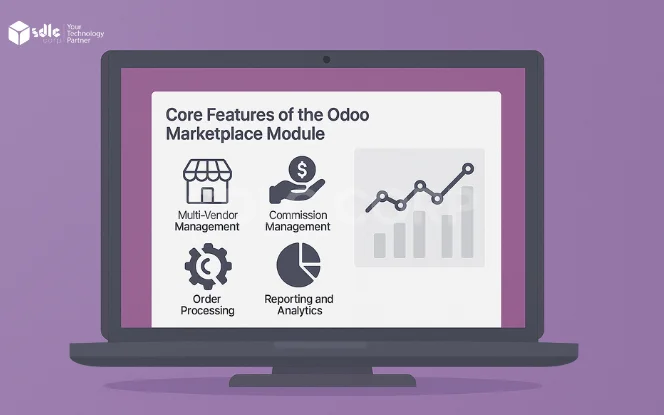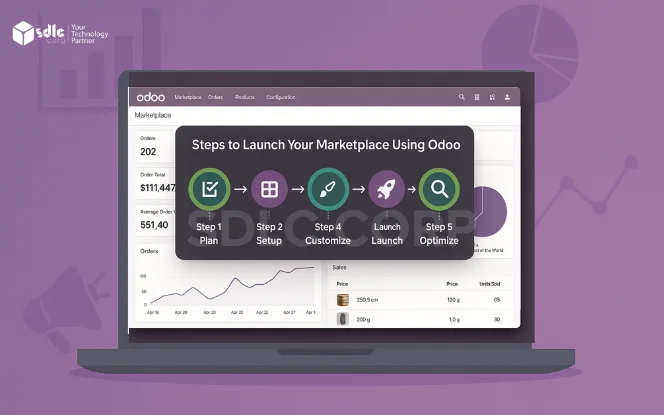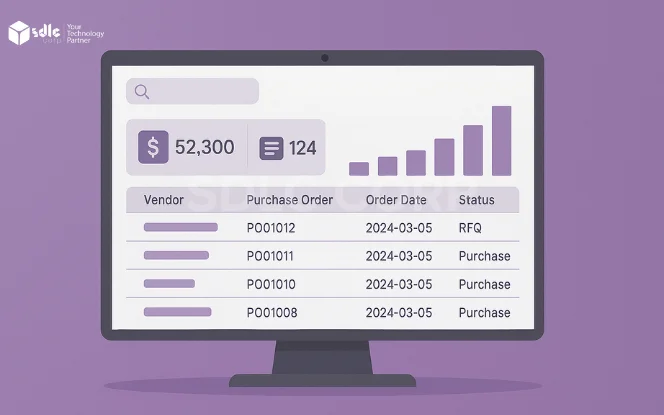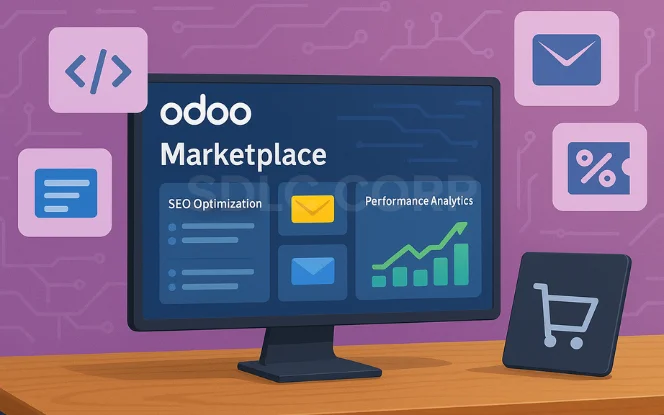Introduction
In the rapidly evolving digital landscape, establishing a robust online presence is paramount for businesses aiming to expand their reach and enhance customer engagement. Odoo Marketplace emerges as a comprehensive solution for entrepreneurs and enterprises seeking to build a dynamic and scalable multi-vendor marketplace. Leveraging the power of Odoo ERP, businesses can seamlessly integrate various functionalities, ensuring efficient management of sales, inventory, and customer relationships.
Odoo Marketplace Development offers a modular approach, allowing businesses to customize their platforms according to specific needs. With features like automated workflows, real-time analytics, and seamless third-party integrations, Odoo stands out as a versatile choice for marketplace development.
1. Why Choose Odoo for Your Marketplace?
Odoo is an open-source ERP system known for its flexibility and modularity. The Odoo Marketplace module seamlessly integrates with other Odoo apps like Sales, CRM, Inventory, and Accounting making it ideal for entrepreneurs building a connected, data-driven business.
Key Benefits:
- All-in-one integration with other Odoo modules
- Scalable architecture for growing vendor networks
- Real-time data and inventory synchronization
- Advanced payment and shipping workflows
- Complete Odoo environment flexibility
2. Core Features of the Odoo Marketplace Module
The Odoo Marketplace module extends Odoo’s ecommerce capabilities by introducing a multi-vendor model. It allows external vendors to register, manage products, track orders, and monitor earnings all from a centralized dashboard.

Vendor Features:
- Product upload and management
- Order tracking
- Commission configuration
- Vendor-specific dashboards
Admin Features:
- Centralized product and vendor approval system
- Commission and revenue management
- Order routing and shipping rules
- Built-in vendor analytics
These features are fully manageable from the Odoo admin panel, providing real-time control over marketplace operations.
3. Steps to Launch Your Marketplace Using Odoo
Launching a marketplace with Odoo involves strategic planning, technical configuration, and continuous iteration. Here’s a step-by-step overview:

Step 1: Define Your Marketplace Niche
Choose a product or service category and target audience. A niche focus enables you to attract vendors and customers efficiently.
Step 2: Select the Right Odoo Company or Partner
Working with an experienced Odoo consulting partner ensures professional implementation, seamless integration, and ongoing support. Choose a partner familiar with your industry to achieve faster go-to-market outcomes.
Step 3: Set Up the Odoo Environment
Deploy your Odoo environment either on-premise or in the cloud. Cloud hosting is often preferred for scalability and uptime reliability.
Step 4: Install and Configure the Odoo Marketplace Module
Using your Odoo admin dashboard, install the Marketplace module and link it with other essential modules like Inventory, Accounting, and CRM.
Step 5: Apply Odoo Customization
Customize vendor registration flows, commission models, product listings, and checkout processes. Expert Odoo developers can tailor these flows using XML, Python, and Odoo Studio.
Step 6: Build with Odoo Themes
Use pre-built or custom Odoo Themes to create a responsive and visually appealing Odoo website. This ensures that your marketplace is both functional and brand-consistent.
Step 7: Test and Launch
Before going live, thoroughly test the Odoo Advance Website features, including cart behavior, vendor dashboard functionality, and payment workflows.
4. Customizing the Odoo Marketplace for Business Needs
Every business is unique. That’s why Odoo customization plays a key role in creating a marketplace that fits your operational model. Some common customization examples include:
- Dynamic Commission Rules – Set different commission rates based on vendor type or product category.
- Custom Product Approval Flows – Multi-step validation for quality control before listings go live.
- Role-Based Access – Fine-grained user access rules for vendors, managers, and admins.
Professional Odoo developers can help adapt these features without compromising performance.
5. Automating Marketplace Operations
Odoo is known for its powerful automation tools. With Odoo automation, you can reduce manual tasks and improve operational efficiency across the board.
Examples of Marketplace Automation:
- Auto-approve vendor registrations based on predefined rules
- Trigger email notifications for order updates or inventory levels
- Automatically assign delivery methods and carriers based on order weight or value
- Sync product feeds from vendors in real-time using APIs
When integrated correctly, automation can drastically cut operational overhead and enhance the vendor and customer experience.
6. Managing Vendor Purchases and Orders

As your vendor base grows, managing procurement becomes crucial. The Odoo purchase management module helps you:
- Create automated purchase orders for vendor restocking
- Track deliveries and logistics in real-time
- Manage invoicing and payments per vendor
- Analyze vendor performance through reporting tools
Combined with your Odoo Marketplace module, purchase management ensures you never lose control over vendor supply chains.
7. Migrating to Odoo Marketplace from Another Platform
Already running an ecommerce site on Magento, Shopify, or WooCommerce? Odoo migration service enable you to transfer products, users, orders, and even SEO metadata into the Odoo ecosystem.
Migration Checklist:
- Product and variant data migration
- Customer/vendor account migration
- Order and invoice history
- SEO-friendly URL preservation
- Theme and frontend redesign with Odoo Themes
SDLC Corp, a trusted Odoo company, specializes in end-to-end migration with minimal downtime and complete data integrity.
8. Scaling and Optimizing Your Odoo Marketplace

Once your platform is operational, it’s time to optimize and scale. Key areas include:
- SEO Optimization: Use meta tags, canonical URLs, and structured data for all listings.
- Marketing Automation: Email campaigns, coupon codes, and push notifications using Odoo Marketing modules.
- Analytics & KPIs: Leverage the Odoo Dashboard for insights into sales, vendor performance, and traffic.
A growing marketplace benefits from continuous Odoo implementation updates and module upgrades. Partner with reliable Odoo consulting partners for periodic reviews and scalability audits.
Security, Compliance, and Support
Ensuring your marketplace is secure and compliant is non-negotiable. Implement the following:
- SSL Encryption
- GDPR-compliant data policies
- 2FA for admin and vendors
- Daily backups of the Odoo environment
Work with an Odoo company that offers round-the-clock support and compliance monitoring to keep your marketplace safe and trustworthy.
9. Final Thoughts: Your Marketplace, Powered by Odoo :
Launching an online marketplace doesn’t have to be complex. With the Odoo Marketplace module, you get a head start by leveraging a fully integrated ERP system that’s already trusted by thousands of businesses globally.
From Odoo customization and automation to performance scaling and vendor management, Odoo offers a future-ready solution for digital entrepreneurs. By partnering with experienced Odoo consulting partners and certified Odoo developers, you can confidently create a marketplace tailored to your goals and audience.
Conclusion
Launching a multi-vendor marketplace is a complex but rewarding venture. With the Odoo Marketplace module, combined with the right set of tools, themes, and expert developers, you can build a thriving ecosystem tailored to your vision. From Odoo customization and Odoo implementation to post-launch Odoo automation and vendor management, every aspect is covered within the scalable and modular Odoo environment.
FAQS
What Is Odoo Marketplace and How Does It Work?
Odoo Marketplace is a comprehensive module that transforms your Odoo eCommerce platform into a multi-vendor marketplace. It enables multiple vendors to register, manage their products, process orders, and monitor earnings through dedicated dashboards. The platform seamlessly integrates with Odoo’s core modules like Sales, Inventory, and Accounting, offering a unified solution for marketplace management.
Why Should I Choose Odoo for Building My Marketplace?
Odoo offers a modular and scalable architecture, making it ideal for building online marketplaces. Its open-source nature allows for extensive customization, and its integration capabilities ensure streamlined operations across various business functions. Additionally, Odoo’s active community and regular updates provide continuous improvements and support.
How Can I Customize the Odoo Marketplace to Fit My Business Needs?
Customization in Odoo Marketplace can be achieved through Odoo Studio, XML, and Python scripting. You can tailor vendor registration processes, commission structures, product approval workflows, and user interfaces to align with your specific business requirements. Engaging with experienced Odoo developers or consulting partners can facilitate these customizations effectively.
How Does Odoo Handle Vendor Commissions and Payments?
Odoo allows administrators to set up flexible commission structures based on product categories, vendor types, or sales volumes. The system can automatically calculate commissions, generate invoices, and process payments to vendors, ensuring transparent and efficient financial transactions.
Can I Migrate My Existing E-commerce Platform to Odoo Marketplace?
Yes, migrating from platforms like Magento, Shopify, or WooCommerce to Odoo Marketplace is feasible. The migration process involves transferring product data, customer and vendor information, order histories, and SEO metadata. Engaging with Odoo migration experts ensures a smooth transition with minimal downtime.
How Does Odoo Support SEO for My Marketplace?
Odoo provides built-in SEO tools that allow you to optimize meta titles, descriptions, and keywords for your marketplace pages. It also supports structured data markup, enhancing your site’s visibility in search engine results. Additionally, Odoo’s responsive themes ensure mobile-friendliness, a critical factor for SEO.
Is It Possible to Automate Operations in Odoo Marketplace?
Absolutely. Odoo’s automation capabilities enable you to streamline various operations, such as auto-approving vendor registrations, sending email notifications for order updates, assigning delivery methods based on order parameters, and syncing product feeds using APIs.






